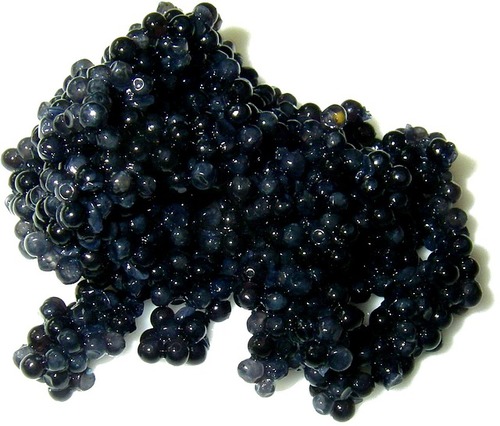Is Caviar Bad For You?
Also Known As: roe from wild sturgeon, black gold
Short answer
Caviar isn’t bad for you, but it’s expensive and can contribute to overfishing.
Recommended Alternative
Overall beneficial to your health. Things rated a 'B' may have some harmful qualities to pay attention to.
View Full Grading System
Category 'A'
Very healthy and numerous health benefits. Side effects are rare. Things rated an 'A+' are typically necessary for survival (for example, water).
Very healthy and numerous health benefits. A few harmful qualities may be associated, but only under certain circumstances such as an allergic reaction.
Very healthy and numerous health benefits. Harmful qualities may be associated, but aren't usually serious.
It is important to note that even the best things in life can become bad in immoderate amounts. So, although something may be rated an 'A+', overconsumption/overdoing can bring unwanted effects.
Category 'B'
Very beneficial to your health. Things rated a 'B+' may have a few harmful qualities to pay attention to.
Overall beneficial to your health. Things rated a 'B' may have some harmful qualities to pay attention to.
More beneficial to your health than not. However, harmful qualities are most likely associated and shouldn't be overlooked.
The main difference between category 'A' and category 'B' is the harmful qualities typically present in 'B' items. Serious side effects are usually uncommon, but are still possible and should be taken note of.
Category 'C'
Both beneficial and harmful qualities associated. Things rated a 'C+' are typically a bit more on the beneficial side. Still, moderation is important.
A fairly even ratio of beneficial and harmful qualities. Moderation is important. Very general topics that can lean towards both sides of the spectrum will be placed here as well. Rice, for example, can be good or bad depending on the type.
More harmful than beneficial. Side effects are common, especially when consumed/done excessively. Moderation is very important.
Category 'C' usually denotes to both good and bad qualities. When it comes to this category, it is important to keep this word in mind: moderation.
Category 'D'
Harmful to your health. Although benefits may be associated, the bad most likely outweighs the good. Moderation is very important.
Harmful to your health. A few benefits may be associated, but the bad outweighs the good. Moderation is extremely important.
Harmful to your health. Very few, if any, benefits are present. Things in this category should be avoided as much as possible.
Category 'D' is typically for things that are more harmful than beneficial. While consuming/doing something unhealthy once in a blue moon shouldn't hurt, we definitely recommend eliminating 'D' items as a regular part of your routine/diet.
Category 'F'
Category 'F' is for things that fail to bring anything beneficial to the table, and are very harmful to your health. We recommend completely avoiding anything in this category. Long-term side effects of 'F' items are usually very serious.
Category 'N'
'N' stands for neutral. Things placed into this category are generally (a) neither good nor bad for you, or (b) lack the necessary evidence to reach any conclusions.
Long answer
Caviar is expensive: even if it isn't bad for your health, it's certainly bad for your wallet. If you can afford it, though, you'll get a healthy dose of vitamins. Caviar has some essential vitamins - it contains vitamin A and vitamin E, which are both needed for various different organs to function properly. An ounce of caviar won't deliver the doses of A or E that you need for the day, but it's a step in the right direction.
Caviar is rich in omega-3 fats. A diet with the right ratio of omega 3 to omega 6 fats can help to slim the waistline, reduce the risk of chronic diseases, and prolong your life. Eating caviar on its own won't get you there - you need sources of omega 6 in your diet to reap the benefits, and you need to maintain the right ratio. If you're looking for omega 3, however, caviar is one way to get it.
There are important minerals in caviar, too - it's got a healthy dose of zinc and iron, which boost the immune and circulatory systems respectively. There's not a ton of either, but there's enough to bear mentioning. If you're suffering from a deficiency of one or the other, caviar could be one step towards rebalancing the minerals in your diet.
Caviar doesn't generally have elevated levels of toxic heavy metals or mercury. An environmental assessment provided in the sources below looked at heavy metals in both wild and farmed sturgeon; they found levels that were within the regulatory limits set by the United Kingdom. That means that moderate consumption of caviar probably isn't going to lead to heavy metal poisoning. Heavy consumption of caviar, though, is still a big question mark - probably because caviar is too expensive for there to be enough heavy users for a statistically significant sample.
Caviar isn't just unsustainable for the wallet - it's also unsustainable for some sturgeon populations. Food and Water Watch reports that certain sturgeon species, like the Beluga Sturgeon, are in decline from overfishing. It takes a while for sturgeon to mature to the age where they can be harvested for caviar - longer than global demand can keep up with. If you're eating caviar, seeking farmed sturgeon or American varieties may be the best option.
Possible long-term side effects
- weight gain
-
long-term effects not well understood
Benefits
- source of:
-
vitamin a
-
vitamin e
-
omega-3s
-
zinc
-
iron
Our Wellness Pick
(what is this?)
Romanoff Black Lumpfish Caviar
- Rich in Omega-3
- Low-calorie option
- Protein source
- Convenient 3-pack
- Elegant appetizer
Learn More!
Please turn your Ad Blocker off to see this content. Thank you!

 Approved by
Approved by 















